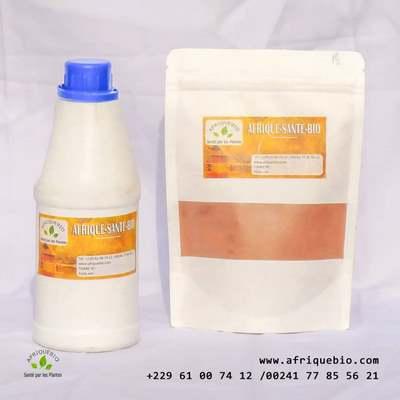Herbal Tea 417: Polycythemia vera Natural Remedy Polycythemia vera
Natural Treatment Polycythemia vera or Polycythemia vera. Here is the Natural Treatment that cures Polycythemia vera. It is effective, without side effects and easy to use. Here are the plants and natural treatments to eliminate polycythemia vera
Please reach us at http://wa.me//+22967546677
Click below to order clove oil
Book an appointment with lady feranmi on
300,00€ excl. tax - 300,00€ inc. tax
- Supplier : Afrique-bio.
- Manufacturer : Afrique-bio
Polycythemia vera Treatment: Natural Polycythemia vera Treatment
Natural Treatment of Polycythemia vera
Natural Treatment of Polycythemia vera
What is polycythemia vera?
Polycythemia vera, also known as polycythemia vera, is an overproduction of red blood cells. It's a rare disease that originates in the bone marrow. Indeed, the latter will produce too many red blood cells which will then pass into the blood and cause a certain number of non-specific symptoms.
Click on ewebio.com for your Natural Treatment of Polycythemia vera or Polycythemia vera
Polycythemia vera prevalence
Polycythemia vera is a non-contagious, non-hereditary disease that affects men and women equally. The number of new cases per year is estimated at 10 to 15 per 100,000 inhabitants. Generally, the disease is diagnosed around the age of 60.
Overview of Polycythemia vera
Scientifically, polycythemia vera or polycythemia vera is described as an acquired myeloproliferative syndrome (excessive proliferation in the bone marrow) characterized by an overproduction of red blood cells.
Bone marrow is the tissue contained inside the bones where blood cells, namely red blood cells, white blood cells and platelets, are produced. Normally, the production of red blood cells is stimulated and controlled by a growth factor hormone called "erythropoietin" or "Epo".
In polycythemia vera or so-called "primary" red blood cell production increases spontaneously without observing an increase in Epo in the blood.
Conversely, so-called "secondary" polycythemia results from an abnormal increase in blood Epo levels.
The increase in production is due to the presence within diseased cells of a mutated protein called "JAK2" resulting in an uncontrolled proliferation of red blood cell precursor cells.
Symptoms of polycythemia vera
The manifestations of polycythemia vera vary from one patient to another. However , we generally observe
red discoloration (erythrosis) of the skin, mainly on the face, the palms of the hands and the mucous membranes (mouth, conjunctiva)
headache
dizziness,
sensation of "flying flies" in front of the eyes,
ringing in the ears
tingling
tingling in the fingertips.
Erythromelalgic crises are characteristic of the disease, but often inconstant. These are painful episodes described in the extremities of the feet or hands associated with redness and a burning sensation. The occurrence of severe itching on contact with hot water is also specific to the disease.
Complications
In the absence of treatment, polycythemia can cause thrombotic complications (phlebitis, stroke, pulmonary embolism, etc.) by obstruction of one or more blood vessels.
There are even more risks with the presence of the following risk factors: tobacco, diabetes, high blood pressure, obesity, excess cholesterol.
In the longer term, the disease can cause fibrosis (invasion of the marrow by fibrous tissue) in the bone marrow, which can lead to the appearance of anemia (lack of red blood cells in the blood ) and an increase in the size of the spleen. It can evolve after several years into acute leukaemia.
Diagnosis of polycythemia vera
Polycythemia vera is mostly discovered incidentally following a blood test or a complete blood count (qualitative and quantitative study of white blood cells, red blood cells and platelets).
The diagnosis is established on the observation of an increase in the hematocrit level. Hematocrit is the number of total red blood cells divided by the total blood volume. When it is greater than 60% for a man and 56% for a woman, the diagnosis of polycythemia is certain.
To determine the type of polycythemia and make the diagnosis of polycythemia vera, it is necessary to look for an increase in the volume of the spleen (splenomegaly) by palpation or abdominal ultrasound. A blood test is also available to highlight the anomaly of the JAK2 gene (present in 95% of patients).
Medical Treatment of Polycythemia vera
When the hematocrit level is too high, so the polycythemia is severe, the first-line treatment is bleeding in order to quickly reduce the risk of complications.
The long-term treatment for Polycythemia vera is an oral "myelosuppressant". Three molecules are available:
Hydroxycarbamide (standard treatment for elderly patients) blocks the synthesis of DNA coding for the JAK2 protein;
Pipobroman (in case of resistance or intolerance to hydroxycarbamide) blocks the synthesis of DNA coding for the protein JAK2
Ruxolitinib (in case of resistance or intolerance to hydroxycarbamide) blocks the JAK2 protein directly.
The treatment must be taken for life by the patient.
It is possible to combine low-dose aspirin in order to limit the thrombotic risk.
Once the diagnosis has been made and the treatment initiated by a specialist, the monitoring of the disease is carried out by the attending physician. First, weekly and then monthly monitoring is necessary once the treatment has stabilized. Nevertheless, it is recommended that the patient consult the specialist once or twice a year.
When detected and treated early, the course of polycythemia vera is chronic (like diabetes for example) with a low risk of complications. Thus, in the vast majority of cases, the patient enjoys a normal life.
Please reach us at http://wa.me//+22967546677
Click below to order clove oil
Book an appointment with lady feranmi on
Add a comment









